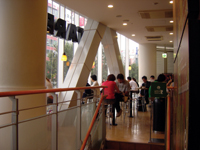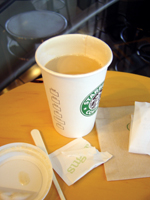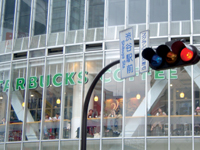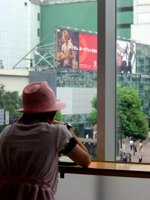Japan's Coffee Kings and the Starbucks Effect
Back to Contents of Issue: November 2003
|
|
|
|
by Leo Lewis |
|
|
Some myths may never die, but for one myth at least, it is time to set the record straight: Starbucks did not invent coffee, nor infinite varieties of coffee, nor relaxing coffee shops in the center of town. The company has merely sold its coffee more expensively and more expansively than anyone before.
The unification of Italy was plotted from the overstuffed armchairs of a coffee shop in Turin. The London Stock Exchange was founded in a cozy City teahouse. In South America, more revolutions have been planned in coffee shops than in any other type of establishment. There was coffee life worldwide before Seattle adopted it as its own.
Despite its huge influence around the world, Starbucks emphatically did not bring coffee-shop culture to Japan. It had been thriving here for years under the powerful market leadership of Doutor Coffee. Like Nova English schools and pachinko parlours, most train stations in Tokyo have a Doutor within easy striking distance. The shops sell cheap hot-dogs and sandwiches to the takeout crowd. Japan's coffee-shop culture has long played a central role in the lives of its urbane citizenry.
It would be reasonable to think that Starbucks outlets, with their evident popularity among young Japanese women, would now pose a killer threat to the cramped, smoky havens of Doutor. The American chain has certainly made its mark on Japan, forking out cash to rent some of the most expensive real estate in Tokyo -- even cheekily opening a shop opposite Doutor's headquarters in Shibuya.
Starbucks may still be expanding, but Doutor has major ambitions of its own. With just over 1,000 Doutor and Excelsior coffee shops in Japan (compared with Starbucks' 454), Doutor's chief executive, Hiromichi Toriba, has recently announced plans to boost the size of his company's franchise chain to 2,000 stores within the next three years. Doutor is in a position to do this, the company believes, because it has directly profited from the abrupt change in Japanese leisure tastes brought about, in part, by Starbucks.
One key to understanding the skill with which Doutor has read the Japanese market lies in the very early history of the company. Toriba founded the chain after traveling around the world to see the many faces of coffee culture. The first stop on his world tour was the Brazilian city of Sao Paolo, where he spent a long time immersed in intensive "coffee studies."
At the time, in the late 60s, tea-drinking Japan was just waking up to the idea of coffee, and Toriba was in Brazil to learn about roasting. (Doutor was in fact founded as a coffee roaster and importer, and that side of the business remains prosperous.) It happened that Toriba's rather run-down digs in Sao Paolo were on a street named after one of Brazil's leading figures: Dr. Pinto Fereis, or Doutor Pinto Fereis in Portuguese. Toriba named his company in memory of his days in Sao Paolo, when he learned the intricate details of bean-picking, selection and roasting.
In 1971, Japan was on the brink of a major economic boom and Toriba had a vision of what his country's workforce would want in the morning. In a flash, he imagined thousands of workers rushing from their houses, giving themselves no time to eat a proper breakfast at home. After a long commute, he thought, these workers would want coffee to pick them up and cheap food to stave off the pangs of hunger until lunch. If they had time to sit, there would be space for them to do it, but otherwise the plan was to set up shops that could handle an ultra-rapid flow of customers, some of whom would prefer to remain upright to dash out the door.
As it turned out, Toriba's predictions were exactly right, and he soon turned his sudden inspiration about what Japanese people would want into a sprawling business. In the thirty years that followed, Doutor expanded steadily but kept the formula much the same as it had always been. It was almost too easy, and the company now admits that there was a period when it took its foot off the accelerator.
When asked what the secret has been this time, Doutor's managing director points out two of his company's approaches. The first is, once again, the expert reading of Japanese tastes. "Starbucks is a good concept, but Japanese people want to eat proper food and smoke," he says. "Plus, by having the shops a bit brighter, people think of Excelsior as a great place to go on a date. It doesn't look so seedy."
For its newfound success, Doutor is openly grateful to Starbucks. Prior to its arrival, say the Doutor executives, their company was suffering along with the rest of the Japanese economy from the ravages of deflation. As providers of already low-priced food and coffee, they were finding it was nearly impossible for their coffee shops to exert any kind of control over pricing.
With its highly priced coffees and specialty brands, Starbucks persuaded the Japanese and almost everyone else in the world that there was a hidden benefit to paying inordinately exorbitant fees for a cup of coffee. Overnight, premium coffee regained its pricing power as the same old beans suddenly took on a new air of mystery and sophistication. @
|
|
Note: The function "email this page" is currently not supported for this page.


 MODERN MYTHS ARE VASTLY more efficient than their ancient rivals. In the old days, a story had to be embellished and retold, generation after generaton, before a really good myth was lodged in the public consciousness. Today, all it takes is an almighty marketing drive -- and some Internet-connected global citizens -- to brew up a myth that millions can swallow in one big gulp.
MODERN MYTHS ARE VASTLY more efficient than their ancient rivals. In the old days, a story had to be embellished and retold, generation after generaton, before a really good myth was lodged in the public consciousness. Today, all it takes is an almighty marketing drive -- and some Internet-connected global citizens -- to brew up a myth that millions can swallow in one big gulp.
 But for Japan's biggest coffee chain, Starbucks has posed few problems. Doutor has managed to ride the Starbucks revolution with an expert's eye for profit, using its deep understanding of Japanese tastes and trends to subtly tailor its activities towards the market it knows. Starbucks has successfully imported an American phenomenon to Japan; Doutor has molded a uniquely Japanese phenomenon. And some analysts believe that Doutor's strategy will be raking in the cash long after the Starbucks shine has worn off.
But for Japan's biggest coffee chain, Starbucks has posed few problems. Doutor has managed to ride the Starbucks revolution with an expert's eye for profit, using its deep understanding of Japanese tastes and trends to subtly tailor its activities towards the market it knows. Starbucks has successfully imported an American phenomenon to Japan; Doutor has molded a uniquely Japanese phenomenon. And some analysts believe that Doutor's strategy will be raking in the cash long after the Starbucks shine has worn off.
 A few years later, executives from Doutor, along with those from other big Japanese roasters UCC and Key Coffee, were invited on a trip around Europe. Toriba, always an early riser, woke up before his peers and went on a morning stroll through the streets of Paris. Passing by a metro station near the financial district, he spotted a sight he had never witnessed before: people standing to drink coffee as they munched on croissants, breakfast rolls and sandwiches.
A few years later, executives from Doutor, along with those from other big Japanese roasters UCC and Key Coffee, were invited on a trip around Europe. Toriba, always an early riser, woke up before his peers and went on a morning stroll through the streets of Paris. Passing by a metro station near the financial district, he spotted a sight he had never witnessed before: people standing to drink coffee as they munched on croissants, breakfast rolls and sandwiches.
 Profits were beginning to slacken considerably until, ironically, Starbucks' arrival. Suddenly coffee became fashionable, and Doutor realized that it had an opportunity to use the competition to kickstart a new era. The Starbucks formula was copied and has given rise to chains like Veloce, Tully's and others. But the most successful version of the formula has been Excelsior Caffe -- Doutor's better-lit version of Starbucks, offering superior food and a separate smoking area. Starbucks unsuccessfully sued Excelsior for using a brand symbol that looked too close to Starbucks' own for comfort. Since then, Excelsior has only grown stronger, both in its operations and its profits.
Profits were beginning to slacken considerably until, ironically, Starbucks' arrival. Suddenly coffee became fashionable, and Doutor realized that it had an opportunity to use the competition to kickstart a new era. The Starbucks formula was copied and has given rise to chains like Veloce, Tully's and others. But the most successful version of the formula has been Excelsior Caffe -- Doutor's better-lit version of Starbucks, offering superior food and a separate smoking area. Starbucks unsuccessfully sued Excelsior for using a brand symbol that looked too close to Starbucks' own for comfort. Since then, Excelsior has only grown stronger, both in its operations and its profits.



